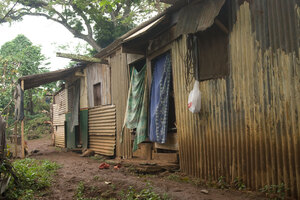[Originally published in the Vanuatu Daily Post’s Weekender Edition.]
I’m often asked for rental advice by visiting volunteers and consultants. My default response is to say, “Before you decide on a place, look around you.” With only one or two notable exceptions, relatively rich expat housing developments are surrounded by jerry-built shacks constructed of cast-off lumber and a few sheets of corrugated metal.

Experience shows that more break-ins happen in places where the greatest disparities exist between expatriate and ni-Vanuatu housing conditions. But the problem of inadequate housing runs much deeper than that.
The majority of houses in Port Vila and Santo have dirt floors. This is not just a cosmetic problem. Scabies, lice, boils, fungal and bacterial infections resulting in ulcerated sores are all commonplace among children in our municipalities. More common, in fact, than they are in our villages.
In Vanuatu, you have to live with the rich to be poor.
The cost to the national economy of abysmally poor housing conditions in Port Vila and Santo is quite literally immeasurable. We simply have no means to determine how many school days are missed by students due to health issues, how many work days lost by their parents, how many futures wasted. Employers suffer too, of course, as yet another source of inefficiency compounds itself with all the other factors to create friction in Vanuatu’s economic machinery.
Children are remarkably effective vectors for infection and illness no matter where they live. But when you stack them all together in progressively smaller plots, it becomes impossible even for model parents to keep their children healthy.
Port Vila has begun to sprawl, reaching out beyond the airport and into Teouma and Rentapao. Houses in nearby Mele, Vanuatu’s largest village, are encroaching on the surrounding hillsides. People are building where gardens once stood.
Migration and a very high birth rate ensure that this rapid expansion has done little to alleviate the pressures faced by the majority of families living in our so-called centres of wealth. More and more people are occupying less and less space. They don’t have access to sufficient quantities of bamboo, natangura and other traditional materials, so they scrounge what they can. Poor sanitation and drainage combined with a lack of reasonable access to power and water contribute significantly to endemic health problems. The utter lack of effective, systematic health care only makes these problems fester.
The solution is quite straightforward. A World Bank-sponsored report from the University of California at Berkeley finds “that replacing dirt floors with cement floors significantly reduces parasitic infestations of young children, reduces diarrhea, reduces anemia and improves cognitive development.”
It’s simple: a strong cement foundation could change the lives of rich and poor alike.
So how do we get there from here? The very fundamentals need to be addressed. I’ve been involved in development issues since I arrived here nearly five years ago, but I’m not aware of a single study that properly illustrates the role that poor housing plays in arresting our development. If and when housing is finally identified as a major inhibitor to development, government will have to begin by creating a cabinet position mandated to address the issue.
Ensuring that this fundamental issue is properly aligned with other development priorities will require that whoever holds the housing portfolio is a consummate navigator of the corridors of power. It will require a true leader, capable of bringing the same kind of focus and attention that won us $68 million from the Millennium Challenge Account and liberalized the telecoms monopoly.
More than that, we will need someone who can keep the whole project from turning into a pork-barrel opportunity of epic proportions. A public works project of this magnitude would attract any number of fly-by-night operators and bring out the worst tendencies of those who’ve made a livelihood of sucking at the government teat.
As an electoral issue, housing would be remarkably compelling for those contesting in the strategically important municipal ridings. The immediate benefits are obvious to any of the tens of thousands of people currently forced by circumstance to make do with less than they had in the village.
But turning campaign promises into reality will, particularly in this case, prove a daunting challenge to candidates encrusted with the political barnacles of elections past. There will simply be too many hands extended for any benefit to reach most individual householders.
The ritual of handing out ‘bags of sugar’ at election time derives from the kastom practice of attaining rank by demonstrating one’s ability to provide for the community. In recent times, that venerable process has become hopelessly compromised, distorted beyond recognition and abused by a cynical few to mask their own greed.
We cannot tackle quality of life issues like this until we unveil and renounce this charade for once and for all.
The issue of housing in Vanuatu is purest proof that everything is political. Only through fundamental change in our political processes and personalities will politicians be able to move government from the dirt floor it’s living on and build a strong foundation for themselves – and for their people.

Graham,
You have made some very valid points. I particularly like the idea of making housing a ‘political’ issue which in vanuatu seems to be they way to go these days (using politics to get something done I mean). I was born and bred in a rural village and I can say now that our houses, made with bamboo walls, wooden frames and thatched leaves, all got from the bush, provided far more superior and dare I say it, luxurious, accomodation than the eye sores you see in the shanty areas in Port Vila and Luganville. If they started to look in need of repair, they would just be torn down and a new one built within a week.
Les